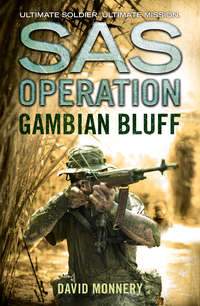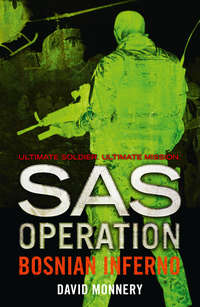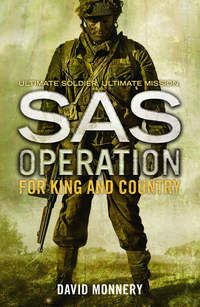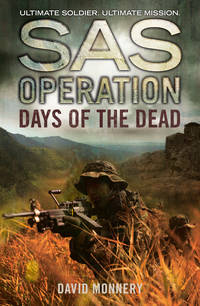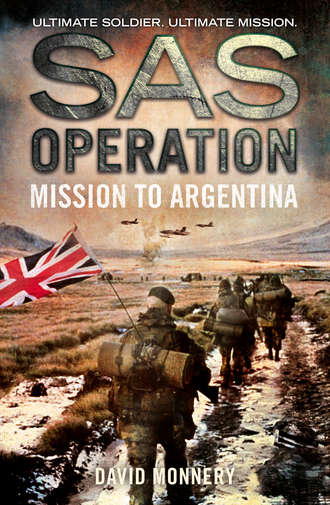
Полная версия
Mission to Argentina
His name was Raul Vergara, and fifteen minutes later they were dancing together, the rough serge of his uniform rubbing against her cheek. For one appalling moment she was back in the whitewashed room at the Naval Mechanical School, the lieutenant’s swollen dick pushing against her obstinate lips, the smell of it mixed with the stink of fear that filled the building.
‘You dance really well,’ the shy young pilot whispered in her ear, breaking the dreadful spell.
2
The last slice of orange sun was disappearing into the western sea as the eight SAS men made their way across the deck of HMS Hermes toward the waiting Wessex helicopter. For the first time in many days the sky was clear and the ocean was not doing its best to tip the ship over. Maybe it was a good omen. But it was still bloody cold.
Each man was wearing camouflage gear from head to toe, with the exposed areas of the face painted to match. Somewhere in the bergen rucksacks slung across their backs, among the 90 lb or so of weaponry, communications equipment, medical kit and rations, each man was carrying the tubes of ‘cam’ cream he would need to freshen his make-up when the need arose.
They had split into pairs to check each other’s cosmetic efforts before the final load-up. One of the two patrol commanders, Major Jeremy Brookes, had received five point eight for technical merit but only a minus score for artistic impression. He smiled through his mask at the thought.
Brookes’s patrol, all of them members of G Squadron’s Mountain Troop, were headed for the hills overlooking Port Howard on West Falkland, and none too pleased about it. ‘But all the fucking Argies are on East Falkland, boss,’ Trooper Kenny Laurel had observed, with all the mildness of an articulated lorry.
‘No, Hedge, they’re not,’ Brookes had explained, ‘just most of them. And that’s only as far as we know. The point of this exercise is to determine exactly where they are, every last one of them.’
‘And where they’re not,’ Trooper Davey Matthews had observed.
‘Thank you, Stanley. Besides which, someone had to draw the short straw, and it was us, OK?’
‘Yes, boss.’
Admittedly, Brookes thought as he clambered aboard the Wessex, the straw no longer seemed quite so short. There might not be many Argies on West Falkland, but there was likely to be more than four of them. This was hardly a picnic they were embarking on. At the best it would probably consist of lying in a damp hole for days on end, bored out of their minds. He tried to remember who had said that a soldier’s life was ninety-nine per cent boredom, one per cent pure terror. Was it Wellington? No, it was somebody else, but he could not remember who.
As they sat there waiting for the Wessex crew to appear – ‘Fucking Navy were even late for the Armada,’ someone observed – Brookes foolishly asked his seven co-travellers if any of them could remember.
‘Genghis Khan?’ a member of the other patrol offered.
‘Nah, he said it was ninety-nine per cent terror,’ someone corrected him.
‘Bruce Forsyth,’ Hedge suggested. ‘What do you think, Mozza?’
Trooper David Moseley emerged from his reverie with a start. ‘What?’ he said.
‘His mind’s on other things,’ Stanley said.
The little woman back home, I expect, Hedge thought. ‘It drains your strength, Mozza, even thinking about them.’
‘I was thinking about where we’re going,’ Mozza said, wondering guiltily whether not thinking about Lynsey at such a moment was something of a betrayal.
‘We’re all going to sunny West Falkland,’ Hedge told him, ‘where the beaches stretch golden into the distance and the hills are alive with the sound of sheep farting. We’re all going on a summer holiday,’ he sung, with a gusto Cliff Richard would have killed for.
So would their pilot, who had just arrived with the other two members of the crew. ‘If you don’t stop that horrible row Falkland Sound will be alive with your cries for help,’ he said trenchantly.
‘If you dropped him into Falkland Sound,’ one of the other patrol noted, examining Hedge’s undoubted bulk, ‘it would probably drain it.’
‘Then there’d only be one island to argue about,’ someone else realized.
Major Brookes listened to the banter with half his mind, knowing it for what it was, a giddy chorus of nerves and apprehension. He still could not remember the author of his quote, and as he checked through his memory, another, less amenable one came to mind. He had first heard it from the lips of a dying IRA terrorist the previous year. Lying there, blood flowing freely from a neck wound into sodden leaves in an Armagh lane, the man had looked at him, smiled and recited: ‘this is war, boys flung into a breach, like shovelled earth, and…’
He had died then, and it had taken Brookes many months to find the rest of the verse, and its source. Finally, the wife of an old friend had recognized it as a poem by the American Amy Lowell. He had looked it up and found the rest: ‘and old men, broken, driving rapidly before crowds of people, in a glitter of silly decorations, behind the boys and the old men, life weeps and shreds her garments, to the blowing winds’.
These are the boys, Brookes thought, looking round at them: Mozza with his fresh-faced innocence, ginger-haired Stanley with his sleazy grin, the overwhelming Hedge.
At that moment the lights went out, the rotor blades reached a pitch which made conversation impossible, and the Wessex lifted up from the aircraft carrier’s deck and started moving south-westwards, low across the South Atlantic swell.
Cecil Matheson poured himself a modest finger of malt whisky, took an appreciative sip and carried it across to the window. Through a gap between darkened buildings he could see light reflected on the Thames. In the street below he could see theatre and cinema-goers threading their way through the Saturday evening jam of taxis.
The buzzer sounded on his phone, and he took three quick strides across the room to his desk.
‘Mr Lubanski is on the line,’ his secretary told him.
‘Mr Lubanski,’ Matheson said jovially, wondering, not for the first time, why the American State Department seemed to employ more Poles than the Polish Foreign Ministry. He had met this particular one on his last official visit to Washington, and been more impressed than enamoured of him. The fact that Lubanski was known to privately support a neutral American position vis-à-vis the current dispute only made the coming conversation more fraught with difficulty.
The lack of liking seemed to be mutual. ‘Cecil,’ Lubanski replied, with more familiarity but rather less enthusiasm. ‘What can I do for you?’
‘I’m sorry to take up your time at the weekend,’ Matheson said with as much sincerity as he could muster at short notice. ‘It’s just a matter-of-clarification.’
‘Uh-huh.’
‘The President’s speech on Friday…’
‘The “ice cold bunch of land down there” speech?’ Lubanski asked, a twist of malicious humour in his voice.
That was how Ronald Reagan had described the Falklands, and Matheson winced at the memory. ‘Yes, that one,’ he confirmed. ‘Of course, we don’t share the President’s opinion in that respect, but we are…’ He wanted to say ‘glad that the US Government has at last realized its responsibilities to a NATO ally’, but that would hardly be diplomatic.
‘Pleased that we’ve finally fallen off the fence on your side?’ Lubanski offered.
‘That’s certainly one way of putting it,’ Matheson agreed, ‘though I’d prefer to think you’d stepped down. In any case,’ he continued hurriedly, ‘we’re obviously gratified by the sanctions announced by your Government, and by the President’s promise of matériel aid. As regards the latter…’
‘You’d like to know what’s on offer.’
‘Of course, but I’m sure that question can be handled through the normal channels. I have something more specific in mind.’
‘Which is?’ For the first time, Lubanski sounded vaguely interested.
Time to bite the bullet, Matheson told himself. ‘AWACS,’ he said. ‘Airborne warning and control systems.’
‘I know what AWACS are,’ Lubanski said drily. ‘And without putting too fine a point on it, I think I can safely say the answer will be sorry, but no.’
Like hell he was sorry, Matheson thought. ‘Her Majesty’s Government would like to formally request the loan of just two AWACS,’ he pressed on.
‘Like I…’
‘If I could just continue,’ Matheson said, rather more harshly than he intended, ‘large British naval losses will hardly serve the interests of the United States. I’m sure I don’t need to remind you that the Royal Navy’s primary raison d’être is to safeguard the passage of American troops and armaments to Europe in the event of a major war…’
‘No, you don’t.’
‘Then I fail to see the justification for a refusal of this request.’
‘Bullshit, Cecil. You know damn well why we’re refusing it. Put our own military into this little exercise of yours and twenty years of Latin-American policy goes down the tubes. You’ve already dragged us off the fence for the sake of 1800 sheep farmers, and now you want us to send AWACS planes? Are you sure you wouldn’t like us to nuke Buenos Aires for you?’
Matheson took a deep breath, and swallowed the temptation to tell Lubanski the best thing the State Department could do with its Latin-American policy was to tear it all up and start again. ‘If we can’t defend our ships against attacks from the mainland,’ he said carefully, ‘we may be forced to move against the source of the problem ourselves.’
‘You mean bomb their bases? What with?’
‘Vulcans from Ascension.’
For a few moments there was a silence at the other end. Then Lubanski, sounding more formal, replied: ‘I think the British Government would be wise to examine the United Nations resolutions so far invoked, and particularly Article 51’s definition of self-defence. I’m not at all sure that the United States would regard military action against mainland Argentina as falling within the scope of that definition. And, regardless of such legal niceties, I am completely certain that continued US support is contingent on a certain level of self-restraint in the British prosecution of the war.’
Another short silence ensued.
‘You do realize how this looks from the British Government’s point of view,’ Matheson said eventually. ‘You won’t help us to protect our ships, and you won’t allow us to protect them ourselves in the only way open to us. We’ve got young boys out there,’ he went on, wondering whether sentiment would help, ‘with next to no cover. And they’re not fighting for sheep farmers – they’re fighting against aggression, and for self-determination. I seem to remember,’ he could not resist adding, ‘that one of your presidents almost invented the phrase.’
‘Before my time,’ Lubanski said wearily. ‘Look, Cecil, let me be as frank as I can about this. I personally think your war is a crock of shit, and I wouldn’t have risked alienating a single Hispanic voter or a single Latin-American government to support it. I have colleagues who disagree with me, and who’d love to support the old country, you know, all that Ivy League shit. But even they wouldn’t loan you a single airplane. It’s just too much to ask. This is not our war – it’s yours. You fight the damn thing with what you’ve got.’
‘We intend to,’ Matheson said, struggling to keep his voice level. ‘Thank you for your time,’ he said coldly, and hung up. He could almost hear Lubanski 3000 miles away, smirking about some Brit in a snit.
He shook his head to clear it, and poured out a more generous shot of whisky. He had, after all, got exactly what he had expected from the call. Nothing. And it would do no harm to make the Americans aware, privately, of how angry the British were with them. A measure of guilt might increase their generosity in other matters.
The real problem lay not 3000 miles away, but less than one. Matheson was almost afraid to imagine what alternatives to the AWACS were brewing in the Prime Minister’s restless mind.
The flight took slightly less than a hour, most of it over the sea. Darkness had fallen, but despite the lack of a moon the Wessex crew had no trouble identifying the northern coast of Pebble Island on such a clear night. The Passive Night Goggles, or PNGs, which they had recently received from American sources, only came into their own when they were contour-chasing across the north-central part of West Falkland proper.
They set the Wessex down in a wide stretch of desolate grassland. The ground looked hard enough, but for an instant seemed to give alarmingly. It was, Brookes thought, as he leapt down onto it, like landing on a springy pine-forest floor.
The other three followed him out, and the door closed on the grinning, waving members of the other patrol, bound for a similar mission further down the island. As arranged, Hedge moved off ahead to take up a defensive position on the slight ridge 100 yards to the east. The words ‘So where’s the fucking hotel?’ floated back across the din of the helicopter taking off.
The others grinned, and Brookes examined the map and illuminated compass as the silhouette of the Wessex faded with the sound of its rotors. An almost eerie silence descended. I’m a long way from home, Mozza thought suddenly. At least there’s no fucking wind, Stanley was consoling himself.
Hedge inched his eyes over the ridge line and suddenly came face to face with a dark and menacing shape. ‘Baa-aaa,’ it said. ‘Kebabs!’ Hedge whispered viciously.
They had been deposited just over 14 miles, as the crow flew, from their chosen site for an OP, or observation point, overlooking the small Argentinian base at Port Howard. Of course, there were no crows in the Falklands, and it was, as one of the SAS planners on Resource had observed, a bloody sight further as the penguin flew. The same terrain in, say, Wales, would not have been considered particularly difficult, but here the general dampness and usual high winds made everything twice as difficult.
The spongy ground often seemed as sapping as the Wembley turf in extra time, but occasionally it would either turn hard enough to jar every bone in the body or soft enough to swallow each foot in a clinging, gelatinous muck. The hills were not exactly steep, but large expanses of the slopes were strewn with flat rock slippery with lichen. And no matter which way you turned the wind always seemed to be blowing right in your face.
Given that this particular stretch had to be covered in relative darkness and near-total silence, with 90lb on each back and a less than perfect map, Brookes fully expected the journey to take two whole nights.
He told himself to look on the bright side. At least it was a clear night – no one was likely to walk off a cliff or trip over a sheep. And what had he joined the SAS for if not to experience moments like this, dumped behind enemy lines in a hostile environment with only a few good mates and his own wits to keep him alive, the stars shining bright above? At his age there would not be many more of them. The Falklands might not be Tahiti, but they sure beat the hell out of south Armagh.
They were walking in a staggered version of the diamond formation generally favoured by SAS four-man patrols on open ground at night. Stanley was out front, the lead scout, picking out the required route, with Brookes himself some 20 yards back and to the left. He was the navigational backup, and responsible for the patrol’s left flank. Further back still, out to the right, Mozza was taking care of that flank, while Hedge was ‘Tail-end Charlie’, occasionally spinning round to check their rear. He was about 50 yards behind Stanley.
As was true of any SAS four-man patrol, each man had one or more of the four specialized skills: Brookes had languages and demolition, Stanley demolition and signalling, Mozza signalling, and Hedge medicine and languages. All but Stanley had some knowledge of Spanish, but there was not likely to be much call for it on this trip, unless they took prisoners. Or were taken prisoner themselves.
As an officer, Brookes was enjoying his second term with the SAS; in fact, his military career had become a series of alternating periods spent with them and his own parent regiment, the Green Howards. His first tour of duty with the SAS had involved active service in Oman and training secondments in two other Arab states, while the current stint, now nearing its end, had found him dodging bullets and bombs in Armagh’s ‘bandit country’ and dispensing advice to local defence forces in several newly independent West Indian countries. Hairy it might be, and often was, but service with the SAS had been a great deal more interesting than service with the Green Howards, whom fate had given a less than fascinating peacetime role. War games in West Germany were a lot less fun than he had at one time imagined.
His wife, Clare, had preferred life with the Green Howards, in the days when she had still cared. Now, with both the boys at Shrewsbury and her own small business taking off, Brookes did not believe she even noticed which unit he was attached to. She was too busy scouring the Welsh Marches for the antiques she flogged off to her fellow-countrymen across the Atlantic. Their Hereford house looked more like a museum every time he returned from active duty abroad. Even the Spanish villa they shared with friends of hers seemed like a little piece of Hay-on-Wye.
He found it all hard to think about, and wondered why he was doing so on a starlit stroll through the Argentinian-held Falklands. Where better? he asked himself.
He was not getting any younger – that was half the problem. Sure, he still had most of his hair, although no one would know it from the grey stubble which protruded skinhead-style from his head. And he was just as fit as he had ever been. But he was not Peter Pan, and maybe the bergen on his back did feel a bit heavier than it should. You could make up in experience what you lost in suppleness of limb, but only up to a point.
He was thirty-eight. What was he going to do in seven years’ time, when his active career ran out? Fight for one of the desk jobs? Not bloody likely. But what else? He had always vaguely imagined that Clare would be there to share their old age. He knew it had been completely unfair, not to mention stupid – after all, what possible reason could she have for putting her life on permanent hold while he had fun? – but he had somehow expected that she would. Now when she bothered to write letters they were full of Stephen, her semi-partner. He was queer, of course – ‘He’s gay, Jeremy, not queer!’ – but then again, what did it matter whether or not she jumped into bed with the bastard: the point was that she obviously found him more interesting than her husband.
And then there were the boys. Total strangers to him, and he really had no one to blame but himself.
This was his real family, he thought, this bunch of highly trained lunatics. Men who could mention Genghis Khan and Bruce Forsyth in the same breath. Unfortunately it was a family with a cut-off date.
Up ahead of Brookes, Stanley paused for a moment to check the map against the reading on his illuminated compass. Satisfied, he resumed his progress across the sodden heathland towards the distant silhouette of a low hill, the M16 with attached M203 grenade-launcher cradled in his arms.
How, he wondered, could a man’s mouth feel so dry in such a place? Walking across this island was like walking along the back of an enormous wet dog. He could feel the damp creeping up his legs and thought about the next few days of endless fucking misery in a damp hole. Worse than a Saturday morning in the West Bromwich Shopping Centre with his ex-wife.
The thought of Sharon cheered him up. With any luck she was having a worse time than he was since Brett – what a fucking name! – had been sent down for armed robbery. Stanley nearly laughed out loud. The prat had rushed into a local sub post office, waved a gun around, escaped with about fifteen quid, and then run out of petrol on the slip road to the M6. Brilliant! And this was the man she had left him for, the Inspector Clouseau of the West Midlands underworld.
Still, he had to admit she had been wonderful in bed. That tongue of hers would win the Olympics if they ever introduced it as a sport. He sighed. So it went. There were plenty more tongues out there.
And come to think of it, the hill ahead looked just like a breast. That was the trouble with the SAS: the old winged dagger was certainly a come-on in the pubs around Hereford, but wearing it seemed to involve long stretches of time in places like this where women were particularly thin on the ground. According to one of the sailors on the old ‘Herpes’, the members of Scott’s Antarctic expedition were away from women so long that they had started sleeping with penguins. ‘Not right away, of course,’ the sailor had said, ‘and only heavy petting to begin with. They just kind of slipped into the habit.’
Stanley had not believed a word of it, of course. But he could understand that sort of desperation, he really could.
About 30 yards behind him, Mozza was snatching glimpses at the night sky between watching the men ahead and the empty country on the patrol’s southern flank. This was undoubtedly the clearest night since his arrival in the South Atlantic, but the book he had brought all the way from England was back on the Hermes, and he was having trouble matching up his memory with the constellations filling the heavens above him.
Not that he supposed it mattered which was which. Though he had always liked the idea of the constellations, and as a kid often wondered who had first connected the dots and made them all up. After all, the stars in Orion did not actually suggest a hunter; it was possible to connect them up that way, that was all. In reality it was chaos, which was just as wonderful, and maybe even more so.
He glanced round to check that Hedge was still in sight behind him, then turned his eyes right again. It was funny: he had been really nervous in the helicopter, but now they were down on the ground and alone and in real danger he felt fine. He did not even feel homesick any more, though maybe he would once they got back to the ship.
Did the others feel like that, he wondered. Both Hedge and Stanley had several more years than his twenty-three, and of course the PC was almost middle-aged. It was not just the years, either: sometimes he felt like a real innocent in their company, although there was no real reason why he should. There were not many tougher places to grow up than Manchester’s Hulme estates, so he knew how to use the two great weapons of self-defence: fists and a sense of humour, and not necessarily in that order.
Sex was another matter. Stanley and Hedge hardly ever seemed to talk about anything else, but Mozza could not help wondering whether they actually enjoyed the act as much as the endless anticipation. According to Stanley there was only one difference between sex and an SAS mission – the briefing and debriefing came in a different order. And that was funny, and Mozza had laughed as hard as the rest of them, but it had nothing to do with real life or real people. When he was with Lynsey…well, it was magical. It was not a joke. And he would not dream of making it into one.
Maybe he was just lucky, he thought. He had often thought it. Maybe most people would not have wanted to grow up in Hulme but he would not have changed places with anyone. He supposed his family was poor by British standards, but only when it came to things, and even then, well, they had always had a TV. He had three sisters and two brothers, which had felt a bit too much at times, but they all got on, and being a bit cramped in the flat was probably what had started off the family tradition of spending each Sunday out in the country. That and the fact that his dad’s job with British Rail got them a good discount on rail tickets.
And it had made him self-sufficient. It seemed strange maybe, but Mozza had thought a lot about this, about his ability to be alone in a crowd, to ‘make his own space’ as Lynsey put it, and he reckoned it was just something you had to learn as part of a big family in a small flat.


